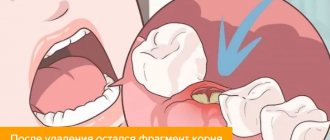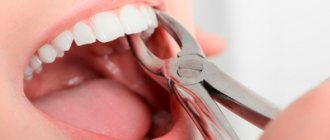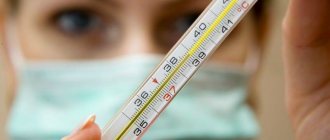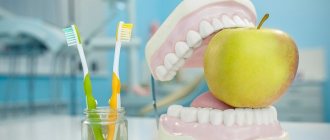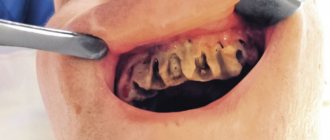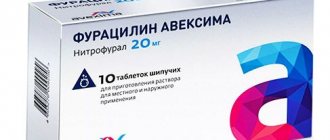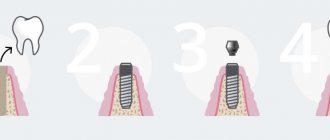Author of the article:
Soldatova Lyudmila Nikolaevna
Candidate of Medical Sciences, Professor of the Department of Clinical Dentistry of the St. Petersburg Medical and Social Institute, Chief Physician of the Alfa-Dent Dental Clinic, St. Petersburg
According to statistics, every second person on the planet has suffered from gum inflammation at least once. It is not surprising: the modern rhythm does not allow us to properly care for the oral cavity; bacteria accumulate between the teeth and begin to actively multiply, which leads to various pathologies.
One of the most popular remedies for gum inflammation is the well-known Miramistin. This powerful solution will quickly destroy harmful bacteria and return you to normal life. But how do you know when it’s time to start rinsing? How to carry out the procedure correctly? Let's figure it out together.
Why do you need to rinse your mouth after tooth extraction?
After the tooth extraction procedure, a hole with damaged blood vessels remains. A blood clot forms in it, protecting the wound from infection. New mucous membrane grows under it, and the periosteum heals. If the clot is accidentally removed or washed out, bleeding may resume. The wound will become vulnerable to various infections. For this reason, complications often develop. Therefore, oral care after tooth extraction should be extremely careful.
Rinsing is prescribed to prevent wound infection and the occurrence of purulent-septic complications. They promote rapid healing of the gums and reduce swelling that is possible after surgery. Only a doctor can tell you whether it is necessary and possible to rinse your mouth after tooth extraction. Trying to treat a wound on your own can be harmful.
Indications for use of Miramistin
Rinsing is often prescribed in the following cases:
- before extirpation (removal) of the tooth, inflammation (pulpitis, periodontitis) was diagnosed;
- the gums were additionally injured (for example, the gumboil was opened, drainage was installed to remove pus);
- There are sources of infection in the oral cavity (carious teeth, stomatitis, tartar, inflammation of the gums, etc.).
These factors significantly increase the risk of wound infection. You can prevent it by knowing how to rinse your mouth. This disinfects the hole, destroys pathogenic microflora, so the likelihood of developing complications is reduced. The main rule is that rinsing should not be too intense. Additionally, the doctor may prescribe antibacterial and anti-inflammatory non-steroidal drugs.
Rinsing is often useful after wisdom tooth removal, since the procedure is traumatic. Eights grow normally only 20% of the time. In 8 out of 10 patients, wisdom teeth are removed at the eruption stage. Due to the peculiarities of their incorrect placement, the tissues are severely damaged, so the recovery period is delayed. Rinsing allows you to speed it up.
In what cases are rinses ineffective?
Knowing what to rinse your mouth with when your gums are inflamed is not enough to cure their inflammation. Various mouth rinses (even the strongest ones), as well as various gels for gums, are only auxiliary means, and will never be able to cure inflammation on their own once and for all. There are 2 main types of gum inflammation – gingivitis and periodontitis. Gingivitis is the initial stage of inflammation, the main symptoms of which are: swelling, redness or bluishness of the gums, pain and bleeding when brushing teeth, bad breath. With periodontitis, these symptoms are accompanied by mobility of teeth, suppuration from periodontal pockets, atrophy (destruction) of the bone tissue around the teeth.
The causes of the development of gingivitis and periodontitis are soft microbial plaque, as well as hard supra- and subgingival dental deposits. In fact, the main cause of inflammation is insufficient oral hygiene. Antiseptic rinses are actively used to treat gum inflammation, but they are only an aid. The main treatment, after all, is the removal of dental plaque by a dentist, after which, ideally, a course of gum treatment is carried out.
If dental plaque has not been removed, and you have started using antiseptic rinses and anti-inflammatory gels, the symptoms of inflammation will certainly decrease for some time. But the inflammation will certainly gradually return again as soon as you finish the course of rinses and applications. The danger of using anti-inflammatory rinses and gels in this case is that they only mask the symptoms of the disease (and the inflammation progresses unnoticed).
In complex therapy for the treatment of gum diseases, you can use not only rinses and gel applications, but also special anti-inflammatory toothpastes for gums, which will very quickly help you reduce bleeding and swelling of the gums. Some of these pastes are also suitable for long-term prevention of inflammation.
Composition and release forms of the drug
"Miramistin" is a drug based on benzyldimethyl ammonium chloride. The concentration of the active component is 0.01%. The drug occupies a leading position among antiseptics and has a wide range of applications. Often used in dentistry. Its action is aimed at combating infections of a bacterial, fungal and viral nature. Miramistin also accelerates wound healing. By stimulating phagocytosis, it enhances the local immune response.
The drug is available in different forms. For rinsing, an aqueous or alcohol solution is used. It is transparent, practically odorless and tasteless.
Recommendations from experts
If you find that your gums are bleeding, you should immediately visit a dentist. Only in this case can serious complications and constant relapses be avoided. The specialist will establish an accurate diagnosis and prescribe effective treatment.
Only experienced specialists take Cerekon in dentistry. Here you will be helped to get rid of bleeding gums quickly and painlessly. The clinic has the latest equipment for accurate diagnosis and high-quality treatment of any dental and periodontal diseases. We offer each patient comfortable treatment conditions and guarantee a positive result.
Remember that it is not always possible to cope with bleeding at home. Sometimes we are talking about more serious diagnoses that require urgent medical intervention. As soon as you encounter this problem, do not delay your visit to the doctor.
How to rinse your mouth with Miramistin after tooth extraction
In the first 1–2 days after extirpation, any rinsing is prohibited. Otherwise, you can wash the clot out of the well. If an infection gets into it, alveolitis or osteomyelitis will begin. In the first case, the socket becomes inflamed, in the second – the bone. That's why they only do baths. Take one sip (10–15 ml) of liquid at room temperature into your mouth, hold it for 1–2 minutes and spit it out.
Next, you should adhere to the following rules:
- Starting from the 3rd–4th day, you can carry out gentle rinsing. To do this, you need to tilt your head several times from the side of the extracted tooth to the healthy one.
- Baths and rinses are carried out immediately after meals.
- After treating the oral cavity with Miramistin for 1–1.5 hours (optimally up to two), you should refrain from smoking, drinking and eating.
In most cases, patients are prescribed 3-4 rinses per day. The course of treatment is up to a week.
After tooth extraction, patients should also pay special attention to oral care. If you are concerned about whether it is possible to do ordinary hygienic rinses, then you should also avoid them at first. In order to maintain hygiene, patients are recommended to use the same baths. To do this, take warm water into your mouth, hold it a little and spit it out. And so several times until you feel fresh.
General dentist recommendations
The oral cavity should be rinsed, holding each portion in the problem area for half a minute (frequency - 5-6 times a day). Do not use a hot solution - body temperature is considered optimal. It is forbidden to use hydrogen peroxide, strong alcoholic drinks, or a concentrated solution of potassium permanganate - this will not alleviate suffering, but will aggravate the situation by burning the mucous membrane.
Sign up for a consultation
It is important to remember that rinsing cannot cope with dental problems - they only help reduce discomfort and to some extent relieve the inflammatory process. A visit to the dental office will allow you to find out the cause of the pain and completely get rid of it.
Features of use during pregnancy and children
The drug can be used by patients of different age categories. It is absolutely safe for pregnant and nursing mothers, since it does not penetrate the mucous membrane or the upper layer of the epithelium. The active substance is not absorbed in the blood. Before using the drug, in order to prevent the manifestation of an allergic reaction, it is worth conducting a hypersensitivity test. To do this, apply a little solution to the skin in the wrist area and rub thoroughly. The body's reaction is assessed after 10–15 minutes. If there is no inflammation, redness, blisters, or rash, then Miramistin can be safely used.
The drug is indicated for children from 3 years of age. Taking the solution at an earlier age is possible only as prescribed by a doctor and under his supervision.
How to rinse an inflamed gum, what medications will help with inflammation
It is first necessary to determine what is the cause of the swelling and redness, since this determines the choice of medicine.
All of them are divided into three categories, in accordance with the main effects they provide:
- Antiseptics and preparations containing antibiotics. They are designed to prevent the spread of bacterial infection. Most often prescribed by dentists for serious illnesses or after operations on the gums, including after nerve removal and wisdom teeth extraction.
- Anti-inflammatory. They are designed to relieve inflammation, reduce pain, eliminate swelling and redness.
- Solutions that combine the two above effects, that is, a combination of them. They are the most effective.
The best way out of the situation is to act according to the doctor’s instructions.
Only a qualified specialist can prescribe treatment that will not cause harm. But if your appointment is scheduled for the next day, you should use medications that definitely won’t hurt, but can have a positive effect on the dynamics of treatment and relieve the first signs. Below we present a list of them.
Chlorhexidine
This is an inexpensive drug that is effective in disinfecting the skin and mucous membranes. It can be used to treat not only scratches and abrasions, but also any wounds in the mouth, including after dental intervention. It kills bacteria well, however, it cannot protect against fungal or viral infections.
Rinsing with a solution with a concentration of 0.05% can be done 2 to 6 times a week. An important note: chlorhexidine cannot be used for a long time, since it, together with pathogenic bacteria, affects beneficial bacteria and washes away the microflora in the oral cavity.
Miramistin
Somewhat more expensive, although the effect can be called similar. The scope of application is much wider, because the medication not only kills the maximum number of pathogenic microorganisms, but also relieves inflammation and irritation of the mucous membranes.
It is also prescribed for stomatitis or herpes.
It is widespread because it is considered absolutely safe even if swallowed by pregnant women or children.
Stomatophyte
A concentrated product that must be diluted with water before use. It perfectly eliminates the inflammatory process, thanks to a large number of medicinal components of plant origin: chamomile, oak bark, arnica, etc. Rinsing is required for 10 days 2-4 times. But you need to be careful - the composition contains alcohol, so it is not recommended for children.
Tantum verde
Essentially, this is the same Chlorhexidine, but the solution contains much more active substance, the concentration of which is 0.15%. Therefore the price is slightly higher.
The medication should be used less frequently - 2 times a day, starting from 12 years of age. It has several effects:
- Relieving swelling.
- Anesthesia.
- Elimination of the bacterial focus.
Rotokan
The effect of the medicine is very wide; many people know this herbal alcohol tincture as a drug to relieve a sore throat. It is also an excellent remedy for rinsing inflamed gums with severe pain. How it works:
- Removes spasms.
- Relieves swelling.
- Accelerates tissue healing.
Contraindications and some features of the use of Miramistin
The drug is not used in case of hypersensitivity to benzyldimethyl ammonium chloride. Patients diagnosed with a catarrhal form of gastritis, which is provoked by an imbalance of the positive microflora of the gastrointestinal tract, should use the solution carefully. Miramistin enhances the effect of antibiotics. When using drugs together, it is necessary to adjust their dosages. The likelihood of adverse reactions occurring when taking the solution is very low.
The use of Miramistin for more than a week is not recommended, since it has an aggressive effect on the microflora of the oral cavity. Otherwise, the number of beneficial bacteria on the mucous membrane will decrease significantly. She will become vulnerable to various diseases. For example, stomatitis may develop.
With rinsing, the pain subsides on the second or third day. Bleeding should be minimal. The saliva may be slightly pink in the first two days. If you feel worse when rinsing, or local symptoms increase rather than go away, you should visit your doctor.

